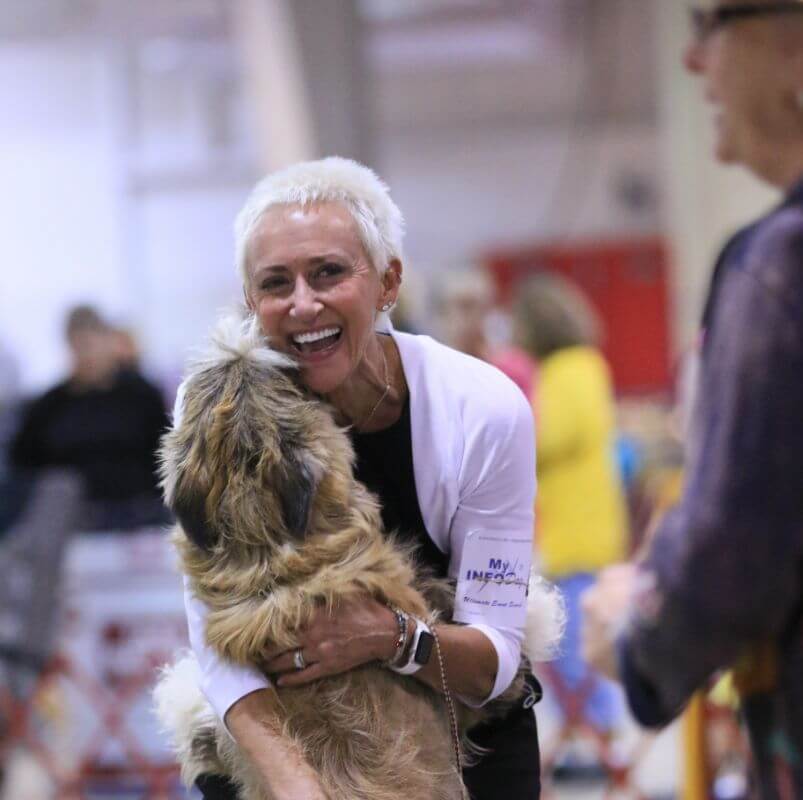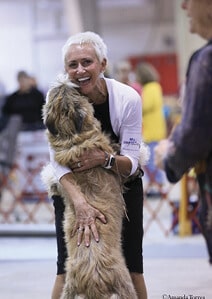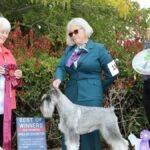Interview with Herding Group Breeder Valerie Black
Where do I live? How many years in dogs? How many years as a breeder?
Valerie Black: My name is Valerie Black. I live in Wisconsin, in a suburb of Milwaukee. I have had my current breed, Berger Picard, and been “in dogs” since getting my first Picard from France in 2005. I have always had dogs as pets, always grew up with them, but never showed or belonged to kennel clubs, etc., until this breed that I am passionate about. My first litter was in 2008, and since then, I have had usually 1-2 litters a year, depending on who is in my house at the time.
What is my kennel name? How many dogs do I currently keep?
Valerie Black: I do not have an actual kennel, although the kennel name is La Vie en Rose. Where I live, we are limited to three dogs, so naturally, we always have three Picards, and I keep only girls as I love having puppies and enjoy the breeding aspect, not to mention competing in the show ring with my dogs.
Which show dogs from the past have been my noteworthy winners?
Valerie Black: My first real show dog was my Genevieve de la Vie en Rose, whom I bred. She and I traveled all over the country, showing as well as participating in many Meet the Breed events. She won our first National Specialty for our breed and she was the first dog I took to Westminster. I will always adore her, as she was so very special. I now have and show her daughter (Select Bitch at Westminster at the age of 21 months, with me, and top bitch in the US at the age of 3). She and I have followed in her mother’s pawprints by traveling and sharing my breed with others, participating in NOHS and invitationals, etc.
Which have been my most influential sires and dams?
Valerie Black: I should mention that when I first got this breed, I had no intentions of really doing anything other than having pets for our family, maybe having a litter or two so that my children could experience it, etc.
I met a very persuasive woman, Betsy Richards (she found me via a Yahoo group for the breed), who called me up and talked me into forming a breed club with her and a few others, showing my dogs, etc. At the time, I had a very busy homelife, with two children in college, two young kids at home, plus my career as a hospital/surgical PA, etc., and I really wasn’t interested. What persuaded me was the idea that we needed to protect and preserve this breed as it came to this country, and preserve it as the French intended. I still feel that way, very strongly, which is why I have been a continuing Board Member of the parent club (Berger Picard Club of America), am immediate past President and current Vice President of the club, teach Judges Education, attend Meet the Breed events, and do my best to educate interested people in the breed.
I do not keep dogs, only bitches in my home, but I have co-owned several of mine and I’m very proud of their accomplishments, not only in the conformation ring and by what they have sired but also in the sports that are related to what they were bred for—herding—as well as other fun sports such as dock diving, agility, barn hunt, etc.
Can I talk a bit about my facilities? Where are my puppies whelped? How are they raised?
Valerie Black: I do not have a kennel, but we do have an old farmhouse that has space for dogs. My puppies are born in my kitchen and raised in our home until they leave. I use Avidog to help “bombproof” the puppies, and I attend as many seminars as I can on both whelping and raising puppies. I am fortunate now to have a group—larger all the time—of friends with children to come over and play with puppies over and over again before they leave. I will typically have two or three in the box with the mom and babies within the first couple of days of life; holding them and petting the mom and babies. Everyone loves that. My moms adore children and it has worked well. I believe a lot of that early stimulation with both loud noises, toys, obstacle courses, and different people (especially children) being around them helps tremendously with how well they fit into their new homes.
What is my “process” for selecting show puppies? At what age do I make my decisions?
Valerie Black: I don’t believe I can truly know who is a “show puppy,” but structure can be evaluated and it gives me a pretty good idea what I have (and usually validates what I have been seeing all along).
My puppies are all temperament tested at seven weeks. So far, I have used the Volhard Puppy Aptitude Test, which, while not designed for a Herding breed, does give me an idea of how confident a puppy is. Then, at about eight weeks, I have a group of judge friends who will come to help me evaluate the litter again, for conformation mostly, but also temperament plays a part then, too.
How do I prepare my pups for the show ring? Does my breed require any special preparation?
Valerie Black: Picards are not the easiest breed. They have been described as aloof with strangers, which can translate into skittishness and sometimes aggression if they are not handled correctly and calmly from an early age. From what I’ve observed, the more I handle them early on, the more easygoing they turn out.
Socialization is the key for my breed, without pushing them too hard. Confident, consistent owners are the key, and if it’s a puppy that I keep, I will generally get them to a puppy class once they’ve had at least two sets of vaccinations. And while I am careful where I take them at that age, it’s a good start and I encourage all my owners to do the same.
Is my breed hand-stacked or free-stacked in the show ring? Why is it presented in this manner?
Valerie Black: In the show ring, Picards can be hand-stacked and, with practice, they will free-stack well. Either way is correct. This is a rustic breed that should be shown as it is. Pretty much, the only grooming is with the ears, which are hand-stripped to show the outline. The occasional bath and a quick brushing prior to going in the ring is all that should be done—and all I have ever done with mine. Unfortunately, while I am a purist and want to protect the breed, some others have over-groomed their dogs, scissored, blow-dried, and put product in the coats, etc., which is not correct per our breed standard and should not be rewarded (ever).
Are Performance and Companion titles important to me as a breeder? Are parent club titles?
Valerie Black: I do, of course, enjoy when my puppy people have performance and companion titles on their dogs as well. For me, with a full-time hospital job, dogs at home, and a family that takes up time, I just don’t have the time. I am also on the board of my local kennel club (current Secretary) as well as with my parent club, so fitting more into my day just isn’t feasible.
In my opinion, is my breed in good condition overall? Any trends that warrant concern?
Valerie Black: The Picard is still new to this country. It is still fairly true to the French standard, and we hope to keep it that way. The BPCA brings over a European judge every four years to evaluate our dogs according to the French Élevage, which is how their breeding stock is chosen. We do our best to replicate those activities, including evaluating all the dogs entered, measuring them, photos and written evaluations, which are all put into a book that becomes the history of our breed in the US. I am hoping this will keep the breed true as best we can.
Is my breed well-suited to be a family dog? Who are the best candidates to own my breed?
Valerie Black: Yes, Picards are family dogs and are very bonded to their families. As with many breeds, there is frequently one special person; but they adore all of their family members. They are Herding Dogs, bred to herd independently of the shepherd and become a “living fence” around their herd, so this can make them protective. With proper and constant socialization during the first couple of years of life, they will acclimate to all sorts of situations. But they must have the work put in, which is stressed to owners as they mature.
Do I feel that my breed is supported by a sufficient number of preservation breeders?
Valerie Black: I do believe there are breeders who truly are preservation breeders. Initially, we did have a few that I would call puppy mills, but those have died out, and most breeders in the US (and there are still not many at all) are careful, comply with health testing, and do their best to make good decisions.
For a bit of fun, what’s the most amusing thing I’ve ever experienced with a Herding Dog?
Valerie Black: Picards are incredibly smart and funny—they think for themselves. They get bored easily, so repetitive sports may not always be the best thing to do unless you can make it fun for them and a challenge. I personally tried agility with a few of mine. My Genevieve, in particular, would do the whole course perfectly—once; the second time (in practice) she would go, maybe, halfway through, then she would just stop and look at me. I knew she was thinking, “What the heck? I already DID this!” We tried all sorts of things (running the course backwards, etc.), but nothing fooled her. It just wasn’t interesting enough!
I have always said Picards are really funny. You can just watch them thinking things through. They may want to please you, but just not in the way you meant for them to do it. So, YOU need a sense of humor too!









